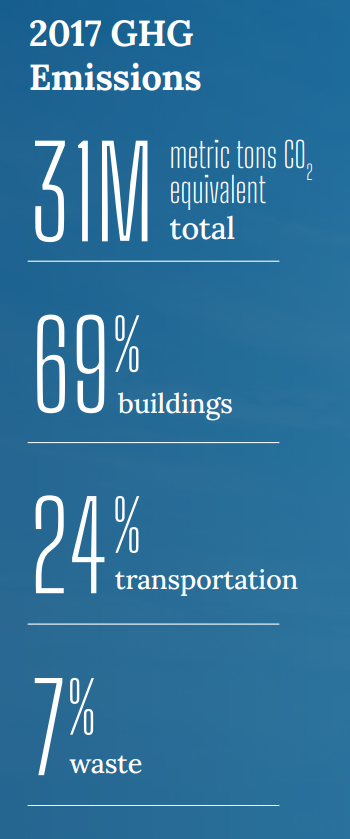Electrify Chicago
An independent tool for viewing City of Chicago building data
According to the
2022 Chicago Climate Action Plan,
69% of Chicago's emissions come from buildings, making
building emissions our biggest challenge and our biggest opportunity as a city
to tackle climate change. At Electrify Chicago, we showcase building performance using
publicly available data supplemented by community-submitted photographs and building
owners.
Start by looking at Chicago's buildings with the highest greenhouse gas intensity i.e. emissions per square foot. Large, efficient, buildings can perform much better than very inefficient small buildings on this metric.
New Article
📰 $30 Million In Missed Fines
The City Of Chicago failed to collect $30 million in potential fines from the building benchmarking ordinance, reducing transparency and accountability.
Legislative update! 🎉
As of late January 2024, legislation is being introduced to require new use more efficient forms of water and space heating, via the Clean And Affordable Buildings Ordinance (CABO), which will reduce the number of highly polluting and inefficient buildings that end up on this site.
If you're in Chicago,
write to your alderman to support the CABO!
Chicago Buildings by Greenhouse Gas Intensity
Note: Data includes large Chicago buildings with data from 2022, unless explicitly stated otherwise.
Note: This data only includes buildings whose emissions are reported
under the
Chicago Energy Benchmarking Ordinance. According to the City “As of 2016,
this list includes all commercial, institutional, and residential buildings larger than
50,000 square feet.” This dataset is also then filtered to only buildings with
reported emissions > 1,000 metric tons CO2 equivalent.
The latest year of data is from 2022, but we update the site regularly when new data is available, and some buildings may have failed to report that year, and only have older data available.
| Property Name / address | Primary Property Type |
Greenhouse Gas Intensity (kg CO2 eq./sqft) |
Total Greenhouse Emissions (metric tons CO2 eq.) |
|---|---|---|---|
|
1035 W Van Buren St
1035 W Van Buren St
| Multifamily Housing | 7.1 kg/sqft
Highest 37%
| 1,785 tons
Highest 26%
|
|
Xavier Apartments
625 W Division St
| Multifamily Housing | 7.1 kg/sqft
Highest 37%
| 1,648 tons
Highest 29%
|
|
Cudahy Library-ID#254164
🕰️
(Loyola)
6515 N Kenmore Ave
| Library | 7.1 kg/sqft | 880 tons |
|
3021 S Michigan Ave
3021 S Michigan Ave
| Multifamily Housing | 7.1 kg/sqft
Highest 37%
| 477 tons
Lowest 24%
|
|
The Montrevelle Condominium Association
520 N Halsted St
| Multifamily Housing | 7.1 kg/sqft
Highest 37%
| 782 tons
Lowest 45%
|
|
Twenty N. State Condominium Association
20 N State St
| Multifamily Housing | 7.1 kg/sqft
Highest 37%
| 1,496 tons
Highest 31%
|
|
7201-09 S Yates Blvd
7201-09 S Yates Blvd
| Multifamily Housing | 7.1 kg/sqft
Highest 37%
| 714 tons
Lowest 41%
|
|
1333 N Kingsbury
1333 N Kingsbury
| Office | 7.1 kg/sqft
Highest 37%
| 740 tons
Lowest 43%
|
|
Peirce Sch Of Intl Studies -CPS
(CPS)
1423 W Bryn Mawr Ave
| K-12 School | 7.1 kg/sqft
Highest 37%
| 1,007 tons
Highest 45%
|
|
Gunsaulus Scholastic Academy -CPS
(CPS)
4418 S Sacramento
| K-12 School | 7.1 kg/sqft
Highest 37%
| 756 tons
Lowest 44%
|
|
Dewey Elementary Academy of Fine Arts
🕰️
(CPS)
5401 S Union Ave
| K-12 School | 7.1 kg/sqft | 610 tons |
|
Metropolitan Water Reclamation District
100 E Erie St
| Office | 7.1 kg/sqft
Highest 37%
| 677 tons
Lowest 39%
|
|
162 North State Street
🕰️
162 N State St
| Residence Hall/Dormitory | 7.1 kg/sqft | 2,253 tons |
|
William Castleman Apartments
(CHA)
4945 N Sheridan Rd
| Multifamily Housing | 7.1 kg/sqft
Highest 37%
| 1,056 tons
Highest 43%
|
|
2400 Lakeview Condo
2400 N Lakeview Ave
| Multifamily Housing | 7.1 kg/sqft
Highest 37%
| 2,067 tons
Highest 22%
|
Data Source:
Chicago Energy Benchmarking Data
